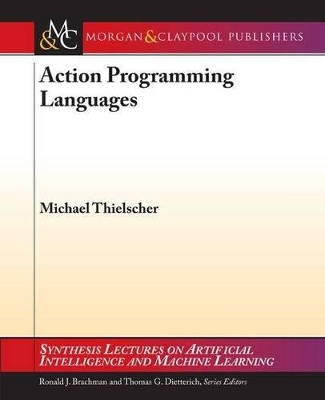Synthesis Lectures on Artificial Intelligence and Machine Learning
2 total works
Artificial systems that think and behave intelligently are one of the most exciting and challenging goals of Artificial Intelligence. Action Programming is the art and science of devising high-level control strategies for autonomous systems which employ a mental model of their environment and which reason about their actions as a means to achieve their goals. Applications of this programming paradigm include autonomous software agents, mobile robots with high-level reasoning capabilities, and General Game Playing. These lecture notes give an in-depth introduction to the current state-of-the-art in action programming. The main topics are knowledge representation for actions, procedural action programming, planning, agent logic programs, and reactive, behavior-based agents. The only prerequisite for understanding the material in these lecture notes is some general programming experience and basic knowledge of classical first-order logic.
General game players are computer systems able to play strategy games based solely on formal game descriptions supplied at ""runtime"" (n other words, they don't know the rules until the game starts). Unlike specialized game players, such as Deep Blue, general game players cannot rely on algorithms designed in advance for specific games; they must discover such algorithms themselves. General game playing expertise depends on intelligence on the part of the game player and not just intelligence of the programmer of the game player.
GGP is an interesting application in its own right. It is intellectually engaging and more than a little fun. But it is much more than that. It provides a theoretical framework for modeling discrete dynamic systems and defining rationality in a way that takes into account problem representation and complexities like incompleteness of information and resource bounds. It has practical applications in areas where these features are important, e.g., in business and law. More fundamentally, it raises questions about the nature of intelligence and serves as a laboratory in which to evaluate competing approaches to artificial intelligence.
This book is an elementary introduction to General Game Playing (GGP). (1) It presents the theory of General Game Playing and leading GGP technologies. (2) It shows how to create GGP programs capable of competing against other programs and humans. (3) It offers a glimpse of some of the real-world applications of General Game Playing.
GGP is an interesting application in its own right. It is intellectually engaging and more than a little fun. But it is much more than that. It provides a theoretical framework for modeling discrete dynamic systems and defining rationality in a way that takes into account problem representation and complexities like incompleteness of information and resource bounds. It has practical applications in areas where these features are important, e.g., in business and law. More fundamentally, it raises questions about the nature of intelligence and serves as a laboratory in which to evaluate competing approaches to artificial intelligence.
This book is an elementary introduction to General Game Playing (GGP). (1) It presents the theory of General Game Playing and leading GGP technologies. (2) It shows how to create GGP programs capable of competing against other programs and humans. (3) It offers a glimpse of some of the real-world applications of General Game Playing.

